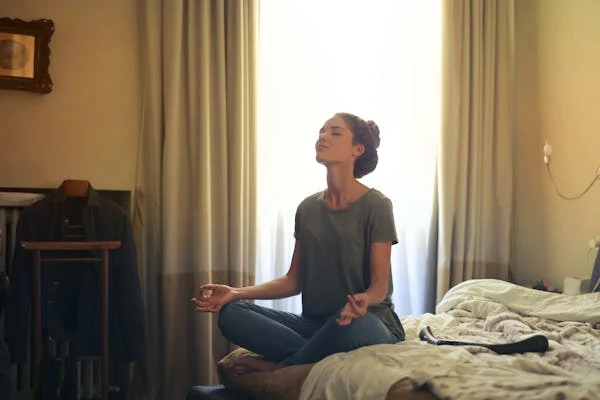Table of Contents
Introduction
Best Time for Meditation-Meditation has been one of the oldest practices that had been embraced over the centuries to bring about benefits that include stress reduction, improvement in focus, emotional wellbeing, and physical health. But probably one of the most essential factors that can improve your meditation practice is timing.
The best time for meditation can vary from person to person, but understanding how the right moment can affect your practice is crucial. In this article, we’ll explore why choosing the good time for meditation matters, and how different times of the day can maximize the benefits of your meditation practice.
Understanding the Connection Between Timing and Meditation Benefits
Meditation is the powerful tool to attain mental clarity, emotional balance, and the physical relaxation. Still, the timing of your practice can influence its effect. A good time for meditation cannot be one size fits all because it could depend on the details such as your daily schedule, energy levels, and personal preferences.
For meditation to take place at the most opportune time, the body and mind have a better chance of achieving the state of deep relaxation and mindfulness. Your body and mind in sync with nature will allow you to achieve more profound results.
Research indicates the differences in brain activity at different times of the day. While the morning is quite fresh and alert, most people find easy concentration and clarity of mind during this time.
On the other hand, it becomes easy to quieten your mind and release the worries gathered during the day before bed. With an understanding of how timing is related to the benefits realized through meditation, you will know how to modulate your practice for maximum results.

Best Time to Meditate: Morning or Night
Among the most common arguments of meditators, one of the most heated debates is whether it’s better to meditate in the morning or at night. Both have their own benefits, and the choice between morning and evening meditation is largely up to your goals and your daily routine.
Morning Meditation
There are several reasons that morning meditation is considered the good time for meditation. In the earlier hours, the mind fresh and uncluttered by the events of the day. Morning meditation gets you a positive tone regarding the rest of the day.
By meditating early in the morning, energy levels increase, focus improves, and a sense of calmness is cultivated over the day.
Morning meditation is also an excellent way to develop a habit. Since mornings are generally less busy and more predictable, it’s easier to carve out time for meditation before the day’s distractions begin. Whether you prefer a few minutes of mindfulness or a longer session, starting your day with meditation can help you maintain a peaceful mindset and approach challenges with greater clarity.
Evening Meditation
While morning meditation is great, evening meditation has its benefits too. After a long day, the mind may be filled with stress, worries, or negative emotions.
Evening meditation is the best antidote to these feelings, making you unwind and decompress. A few minutes of meditation before bed can help ease physical tension, calm the mind, and promote better sleep.
It is also very helpful for those who cannot sleep or have racing thoughts at night. Evening meditation helps send signals to the body that it is time to relax and let things go, which aids greatly in sleep as well as restorative rest. It can also become an emotional cleansing approach for emotional processes before going to bed.
Factors to Consider When Choosing the Best Time for Meditation
When determining the good time for meditation, it’s essential to consider various factors that can affect your practice. These factors include your personal schedule, energy levels, and mental state throughout the day.

Personal Schedule and Lifestyle
Daily routines and timings usually have to determine when one can meditate. While for others it could be early morning before they are supposed to go to work or handle family activities, for others, meditation will be better in the evening since this is usually when it has calmed down a little from busy time. You may realize mid-day meditation works when your schedule is flexible, like working from home, helping to recharge energy.
Energy Levels
Another important factor is your energy levels throughout the day. For many people, mornings are when they feel the most refreshed and focused. This makes it an ideal time for meditation, as the mind is clear and the body is ready for a relaxed yet attentive state.
Alternatively, if you are a type of person who would feel drained or distracted in the morning, then evening meditation can really be your best bet in freeing up the stresses that have built up throughout the day.
Psychological Condition
Another critical aspect that defines the good time for meditation is your mental state. If you wake up with stress and anxiety feelings, meditation in the morning resets you to begin the rest of the day calmer. If you go through a busy day or day with so much emotional exhaustion, meditation gives you the space to open up emotions and return to a peaceful state before sleep.
Benefits at Different Times of the Day
There are benefits of meditation at different times of day. Let’s explore how meditation affects the body and mind when practiced at various times:
Morning Meditation
The best time for a meditation to boost energy, clarity, and focus is in the morning. Since the body has rested while the mind is relatively clear, it’s when you can indeed enter a deep state of mindfulness and concentration.
Morning meditation regularly can brighten up your mood, increase your productivity, and set a good tone for the day ahead. It’s also an appropriate time to meditate in order to cultivate gratitude for a peaceful intention that lasts throughout the day.
Midday Meditation
For many, the middle of the day is a low point in terms of energy levels, especially after lunch. Stepping away to meditate during this time can be extremely rejuvenating. Even a few minutes, 5-10, can clear the mind, reduce stress, and refocus energy. A midday meditation is an excellent way to recharge and enhance productivity for the rest of the day.
Evening Meditation
By evening, meditation is the ideal time to release tension in your body, calm the nervous system, and prepare you for a good night’s sleep. Ideally, the best time for evening meditation is 30 minutes before bed, letting you completely unwind and dive into deep relaxation. Even meditation can help reduce the level of cortisol, anxiety levels, and prepare the body for sleep.

Ways to Make Meditation an Integral Part of Your Daily Life
After learning about the right time for meditation and its advantages, it’s time to introduce meditation as a daily habit. Here are some pieces of advice on how to make meditation an integral part of your daily life:
How to Build a Consistent Meditation Schedule
When it comes to meditation, consistency is key. You can meditate in the morning, lunch, or evening- what’s important is that you give yourself time each day to meditate. Try to meditate at the same time every day to get into a routine. The cumulative benefits of meditation will only be yours if you have a consistent practice.
Adapting to Your Lifestyle
If your schedule is unpredictable, it’s still possible to find a good time for meditation. You can experiment with different times of the day to see when you feel the most centered and focused. Whether it’s during a lunch break, right after waking up, or just before bed, adapt your practice to fit your lifestyle.
Starting Small
Start small with just 5-10 minutes a day if you are a beginner. Gradually increase the time as you get accustomed to it. The best time for meditation is when you can be consistent, even if it is only for a short period.
Some of the most common misconceptions about the best time for meditation:
The number of people wondering whether there is any “wrong” time to meditate is plenty. Truth is, though, there is no universally “wrong” time for meditation. It’s more the good time for meditation that will work for you.
You don’t need to follow strict rules about when to meditate. Practicing regularly is the most important thing, regardless of the time of day.
How to Prepare for Meditation at the Right Time
Preparation while meditation is a must step for enjoying the deepest fruits out of the practice, irrespective of the time it is done. Here are some tips for you:
Creating the Right Atmosphere
Regardless of whether you meditate in the morning or at night, the space needs to be peaceful. Choose a quiet space where you are not distracted and, if needed, you can light candles, use essential oils, or have some soothing music to get you into the right mood.
Pre-Meditation Routine
Having a pre-meditation routine will help signal to your body that it’s time to meditate. It may be deep breathing, stretching, or just sitting quietly for a few moments before starting your practice.

Conclusion: Determining Your Ideal Meditation Time
Your ideal time for meditation differs with different people. If you prefer morning, noon, or evening meditation, then experiment to determine which best works for you.
From the benefits of meditating at different times in a day and taking into consideration your schedule, energy, and mind, you will discover your true meditation. Consistency is the key, therefore, make meditation a part of your daily routine and reap the many benefits it brings.
